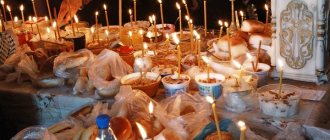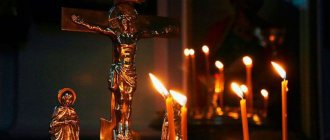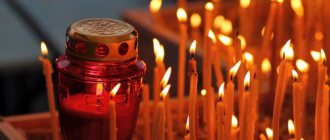Man and soul are inextricably linked. When the physical body dies, the spiritual begins a new path to eternal existence. Where the soul goes after death is determined by how the person lived and how relatives behave during the 40 days. According to Christian customs, the 3rd, 9th and 40th days are of great importance. These are the boundaries that forever separate eternal existence from earthly existence.
40 days from the date of death is not an easy number. It means the duration of the journey to the final refuge. In this material we will consider what happens to the human soul after death for up to forty days. The second question that will be discussed is how the ceremony is carried out in accordance with traditions.
The meaning of the fortieth day
It has a special meaning and there are two explanations for this. Firstly, at this time the spirit travels from the earthly body to eternal life. Secondly, this date marks when the soul comes to say goodbye. People often ask what the soul does after death and how long the spirit of the deceased remains on earth, returning on the fortieth day. We will answer them.
The path after death to the acquisition of eternal existence is quite complex and includes 3 stages:
- 1-3 days . The first is the day of death. During the first three days, the spirit of the deceased comprehends the new state. Ordeals take place near the body. The spirit of the deceased visits places dear to him. He feels shame for the sins he has committed. Then he leaves the earth and goes to heaven.
- 3-9 days . When the spirit leaves home and bodily form, the Guardian Angel escorts him to heaven, protecting him from evil spirits. Then the soul of the deceased appears before the Lord and repents of his sins. This act is given to her with great difficulty, since she must bear responsibility for what she has done before the Most Pure Virgin and the Lord. After the shower, until the ninth day, he gets acquainted with the Kingdom of Heaven.
- 9-40 days . The spirit goes to hell on the ninth day. Here the soul goes through all kinds of temptations. The tests demonstrate how much the spiritual body can control desires and vices.
Thus, the soul of a deceased person after death is not determined until forty days and wanders between heaven and hell. After remembering, she finds peace.
Esoteric warnings
Previously, it was believed that with the onset of darkness, portals opened through which demonic entities could enter the world of the living. For this reason, no one spoke aloud about the deceased after it got dark. Demons could appear on earth in the guise of relatives who are no longer among the living. This is a way to get close to the souls of the innocent, to influence them. With the onset of darkness, they also did not talk about the other world.
The modern opinion of esotericists is somewhat different: negative energy is concentrated in the cemetery. For this reason, the answer to the question of whether it is possible to commemorate in the evening at the grave is negative. After an evening visit to a churchyard, many people feel weak, irritable, and subject to mood swings. Highly sensitive people may even get sick.
Is it necessary to remember
According to beliefs, if a spirit, having descended to earth, does not see a funeral dinner for itself, it will suffer forever. Therefore, for forty days it is necessary to set the table and gather relatives. Relatives and friends also come to remember and pray for the soul.
Commemoration earlier or later
The clergy do not see any sin in holding funeral services earlier or later than scheduled. It is permitted to hold funeral services for the deceased in churches and at home. But the memorial cannot be moved to the cemetery.
Notes about the deceased in the temple
Petitions for the repose of the soul, which are read out during general prayer, can be submitted in any church. The note should list the names of all the deceased, last but not least indicating the newly deceased relatives. It is necessary to write not a worldly name, but the one that was given to the person at baptism. If some baptized names are not known, you should simply indicate “and all relatives” at the end of the list.
The note can be taken from an employee in a specially designated place in the temple - where icons and candles are sold. Having filled out the note, you need to put it in the box, and if there is none, give it back to the employee and he himself will add it to the others.
Procedure at home
The farewell lasts 1-2 hours, everyone present must remember the deceased with a kind word and funeral prayer, this will help the soul overcome all trials.
A commemoration for 40 days after death is organized with the aim of helping the deceased find a new life. It is important to do this while observing the rules of the funeral; let’s look at some of them.
- Crumbs are not thrown away from the funeral table. They are collected and when they visit the cemetery, they will be left at the grave. This is how the deceased knows that the dinner took place.
- When serving, avoid sharp utensils. Therefore, it is better to serve dishes that are easy to eat with a spoon.
- After the funeral meal, spoons are distributed to the guests. This ritual takes its roots from ancient times, when this cutlery was distributed as a lasting memory of the deceased.
- There should be a frame with a photograph on the table, tied with black tape in the lower corner.
- After the funeral, there is always a glass of water with bread on top in the house for up to 40 days. Water must be taken and renewed daily, just like bread. After a forty-day memorial service, you can pour out the water.
- In the evening you need to put a glass of vodka. It happens that in the morning the alcohol has diminished and relatives do not know where it goes. This spiritual body drank from it.
- On the night of the fortieth day, all doors and windows are locked.
- It is allowed to cry for the deceased for forty days; at the funeral dinner, crying will force the soul to stay and suffer.
- It is necessary to cover the place for the deceased.
Debunking popular myths
There are many myths and superstitions associated with funerals and commemorations, which people who follow Orthodox traditions should not believe:
- Needles should be placed crosswise on the lips of the deceased. A myth that has no basis.
- Pregnant women should not attend funerals, otherwise the child will be stillborn. Not true, but impressionable women are better off staying home. Unpleasant emotions can cause severe anxiety and harm the child's health.
- You can only be buried in black. There are no strict guidelines on this matter. Many people, while still alive, select clothes for funerals and must be buried in them.
- Funeral wreaths must be made of fresh flowers. Not true, you can use artificial ones.
- You need to put money in the coffin. This tradition comes from Ancient Egypt and has nothing to do with Christianity.
The main thing in difficult times of grief is to observe the sequence of divine services and not give in to despair. This will help the soul find peace and the living to come to terms with loss.
Menu for the funeral table
Let's look at how to set the table for a wake for 40 days, what is prepared for this event and what is served to those who come.
The main requirement for the menu is simplicity, especially if the event falls during Lent restrictions. It is worth giving up gourmet meat dishes, you need to reduce them to a minimum.
A dish that must be put on the table is fish, which can be prepared in any form. It is customary to prepare rich pancakes, vegetable salads, cutlets, fish aspic, and pies. Drinks on the table include kvass, juices and fruit drinks, jelly, and sbiten. It is also necessary to prepare a ladder, this is a special ritual cookie in the shape of a ladder. It symbolizes spiritual ascent to heaven.
Do they prepare kutya for funerals? Yes, it definitely has to be.
Visit to the cemetery
People go to the cemetery and wear flowers on the fortieth day to support the deceased on his difficult path to eternal existence. According to religion, you can go to the cemetery for up to 40 days after a funeral. This will help the deceased gain eternal life. Clergymen approve of going to the cemetery within a forty-day period. But it is important to consider that visiting the cemetery is allowed only before sunset.
What to bring
Invitees often ask what they bring to the cemetery, whether they need to follow the signs. You can bring flowers, candles and sweets with you. The food brought must be distributed to those you meet and asked to remember the deceased.
Which flowers
Carry or buy artificial and living wreaths at the cemetery. You are allowed to bring a simple bouquet, the best option being roses and carnations.
On day 40
Be sure to visit the grave, clean up, straighten the cross.
Many people mistakenly believe that vodka should be placed on the grave. This is wrong. The truth is this: the church does not encourage the consumption of alcohol during the memorial and during the forty-day period.
Before 40 days
Some people mistakenly believe that going to the cemetery for up to 40 days and visiting the grave is prohibited until the deceased has found his final abode. The only thing that is not allowed is cleaning the grave or straightening the cross. You just need to sit next to him and pray for peace.
About helping a suicide
According to the Bible, life is God's gift, which must be accepted with gratitude and go through all trials with faith and humility. In the Christian tradition, suicide is considered a grave sin. People who commit suicide challenge God himself, refusing his gift, defying his will. They are not buried in the cemetery and are not buried in the church. But relatives can pray for the deceased themselves. You need to read special prayers, for example, an appeal to Elder Lev Optina.
Prayers can be read every day. When pronouncing the words, you need to think about the deceased, sincerely ask God for forgiveness for his soul.
Prayers at funerals
Grief is a natural feeling that every person experiences after the loss of family and friends, and it is best expressed through prayer. Prayers of relatives and loved ones for the deceased before and after 40 days help the spiritual body find new life.
On the fortieth day
On the 40th day, it is necessary to order a memorial service in the church or invite a clergyman to the house/place of his burial. It must be taken into account that ceremonies are not held on church holidays (patronal, twelfth and annual). The funeral prayer is not read in church on Christmastide, before and after the Holy Resurrection of Christ.
After 40 days
After the 40th day, it is imperative to pray on the anniversary of death, the second and third year after death, as well as on Ecumenical Saturdays and Parents' Days.
Until the 40th day
In addition to personal prayer, you must order Sorokoust from the church. This is a daily commemoration of the deceased for up to 40 days. For the fact that the clergy will read 40 days of prayer, they charge a symbolic fee. Costs and prices need to be clarified.
Orthodoxy has special memorial days. These are the third, ninth and fortieth days after death. It is then that it is necessary to especially diligently read prayers for the repose and turn to the Almighty to protect the deceased. It is necessary to remember the deceased only with kind words in order to help the deceased tip the scales of God's Judgment in the bright side.
Church commemoration calendar
On any day you can remember with alms and prayer, light a candle in front of a home icon. But there is also a commemoration calendar compiled by the church, which must be followed:
- Parental Saturdays – Meat Saturday, Trinity Saturday, 2nd, 3rd and 4th Saturdays of Great Lent, Demetrius Saturday.
- Radonitsa. Celebrated after Bright Week (Easter) on Monday or Tuesday.
- May 9 is the day on which fallen soldiers are first remembered.
Memorial days are set aside by the church to unite believers and create a common prayer. It has great power and brings peace to all the departed, and the living - hope of meeting in the Kingdom of Heaven.
Other frequently asked questions
What do people give out?
After the funeral service and meal, refreshments and alms are distributed. Each person who receives them must remember the deceased with prayer.
What to bring to a funeral
You can bring kutya or sweets with you.
What not to do
List of prohibited actions:
- They don't bite the seeds. The question immediately arises: why can’t you chew seeds for up to 40 days? There is a legend that this way the good memory of a person will be spat on.
- They don't clean the house. You could say that cleaning will sweep away the good that is left of a person. You can only clean up after the funeral meal.
- Do not expose reflective surfaces. It is believed that a spirit can take a living person with it.
- Do not wear bright, frilly clothes. Relatives wear modest dark clothes.
Why are there no forks?
According to one belief, those who come use knives and forks to wound the deceased. According to the second, they personify the devil.
Cemetery cleaning
Cleaning must be done after the forty-day period. During it, you need to remove the funeral attributes, sweep, and straighten the cross or monument.
Funeral in Lent
If the wake falls during Lent, it can be held. The only restriction is the table; it must be set in accordance with the requirements of the fast. Orthodox Christians fast at this time.
Why don't they shave?
According to popular belief, you should not shave for 40 days after death or have your hair cut. They do not cut their hair or shave as a sign of respect for the deceased.
Watching TV
It is better not to watch TV, it is a reflective surface.
Evening Remembrance
During the forty-day period, every evening loved ones perform evening remembrance - they pray for the deceased.
How to behave
It is necessary to behave as modestly as possible and not attract attention. Be sure to express your condolences to the family and friends of the deceased. During speeches, you need to listen carefully to the speaker.
What to wear
What to wear is an important question. You need to dress modestly for the event; you should choose clothes in dark shades.
Wake on Sunday
If forties fall on Easter Sunday, they need to be moved to the day after the holiday period ends. On other Sundays, commemoration of the dead is allowed.
Invitation to a wake
Those who knew the deceased are invited. These are relatives, friends, work colleagues, co-workers, classmates, classmates and good acquaintances. Those closest to you must go to the event, the rest - at their discretion. If people cannot come or visit, they call or write to the relatives of the deceased to express condolences.
We looked at what happens to the soul before the forty-day mark and where it is after. We answered the most common question from relatives: how to celebrate and organize a memorial. We hope this material helped you understand the nuances and find answers.











